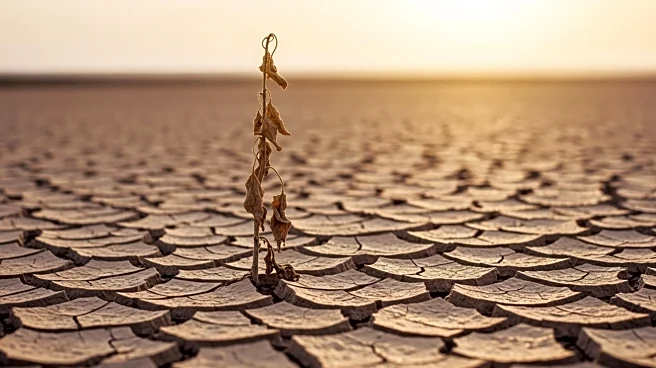What's Happening?
Iran's agriculture minister, Gholamreza Nouri Ghezeljeh, has acknowledged the country's severe food security challenges, exacerbated by unprecedented droughts and macroeconomic instability. During a press conference, Ghezeljeh emphasized the need for the agricultural sector to reduce water consumption and support government efforts to ensure food security. The situation is further complicated by Iran's reliance on traditional farming methods and the extensive use of water resources in agriculture, which accounts for 80% to 90% of the country's water usage. The Ministry of Intelligence has warned of potential economic and security crises, including rising unemployment and social unrest, if the snapback mechanism is reactivated, affecting Iran's oil sales.
Why It's Important?
The acknowledgment of food security issues by Iran's agriculture minister underscores the critical challenges facing the country. The combination of drought, climate change, and economic mismanagement threatens Iran's ability to sustain its agricultural sector and secure food supplies. This situation could lead to increased reliance on imports, further straining the economy. The potential for social unrest and economic crises poses significant risks to the stability of the Iranian regime. The focus on reducing water consumption in agriculture highlights the urgent need for sustainable practices to address the water bankruptcy crisis.
What's Next?
Iran's government may need to implement more aggressive measures to address water shortages and improve food security. This could involve modernizing agricultural practices and investing in water-saving technologies. The international community may also play a role in providing support or pressure to ensure Iran addresses these challenges effectively. The potential reactivation of the snapback mechanism could further complicate Iran's economic situation, necessitating diplomatic efforts to mitigate its impact.
Beyond the Headlines
The food security crisis in Iran highlights broader issues of environmental sustainability and economic resilience. The reliance on traditional farming methods and the extensive use of water resources reflect systemic challenges that require long-term solutions. The situation also raises ethical questions about resource management and the responsibility of governments to ensure the well-being of their populations.









